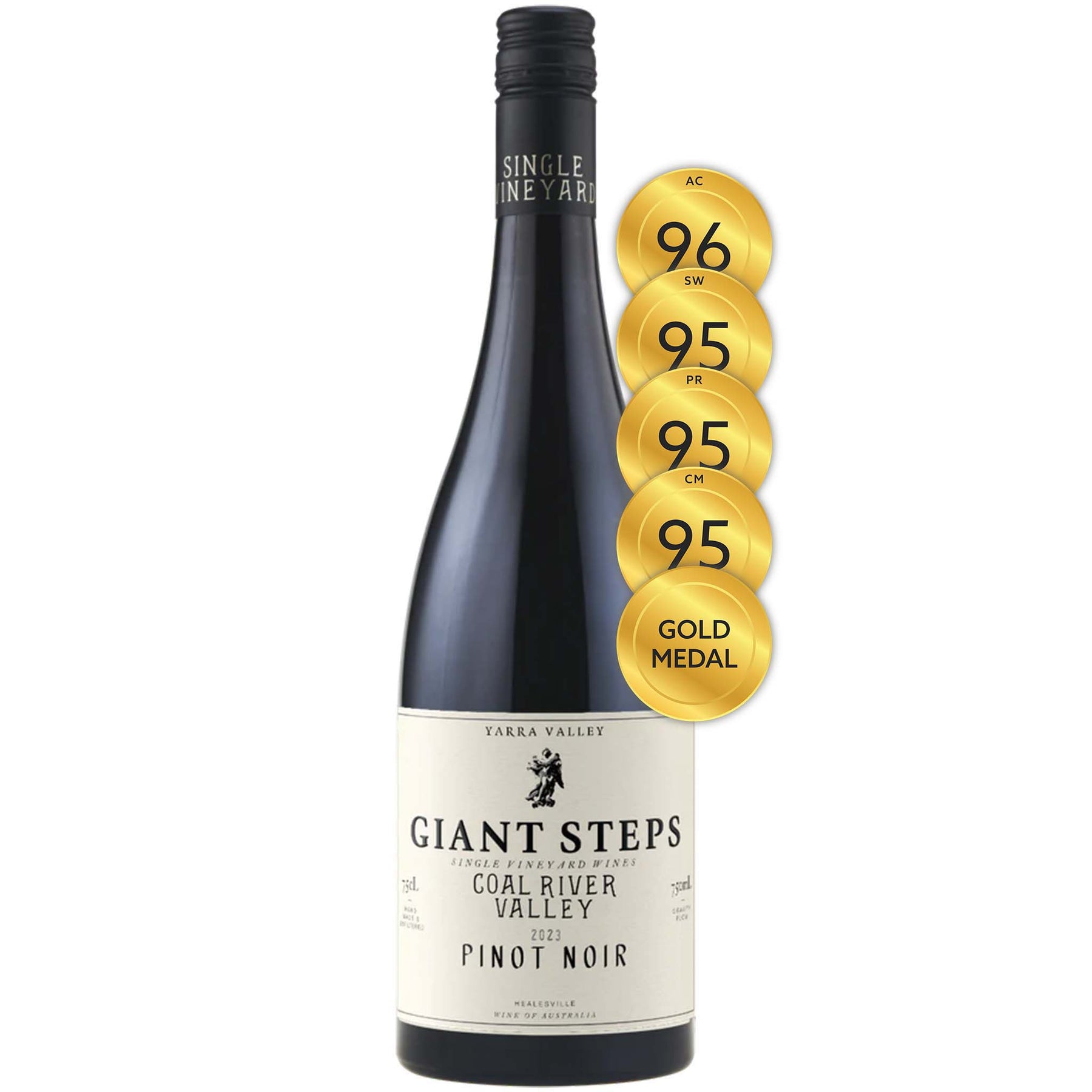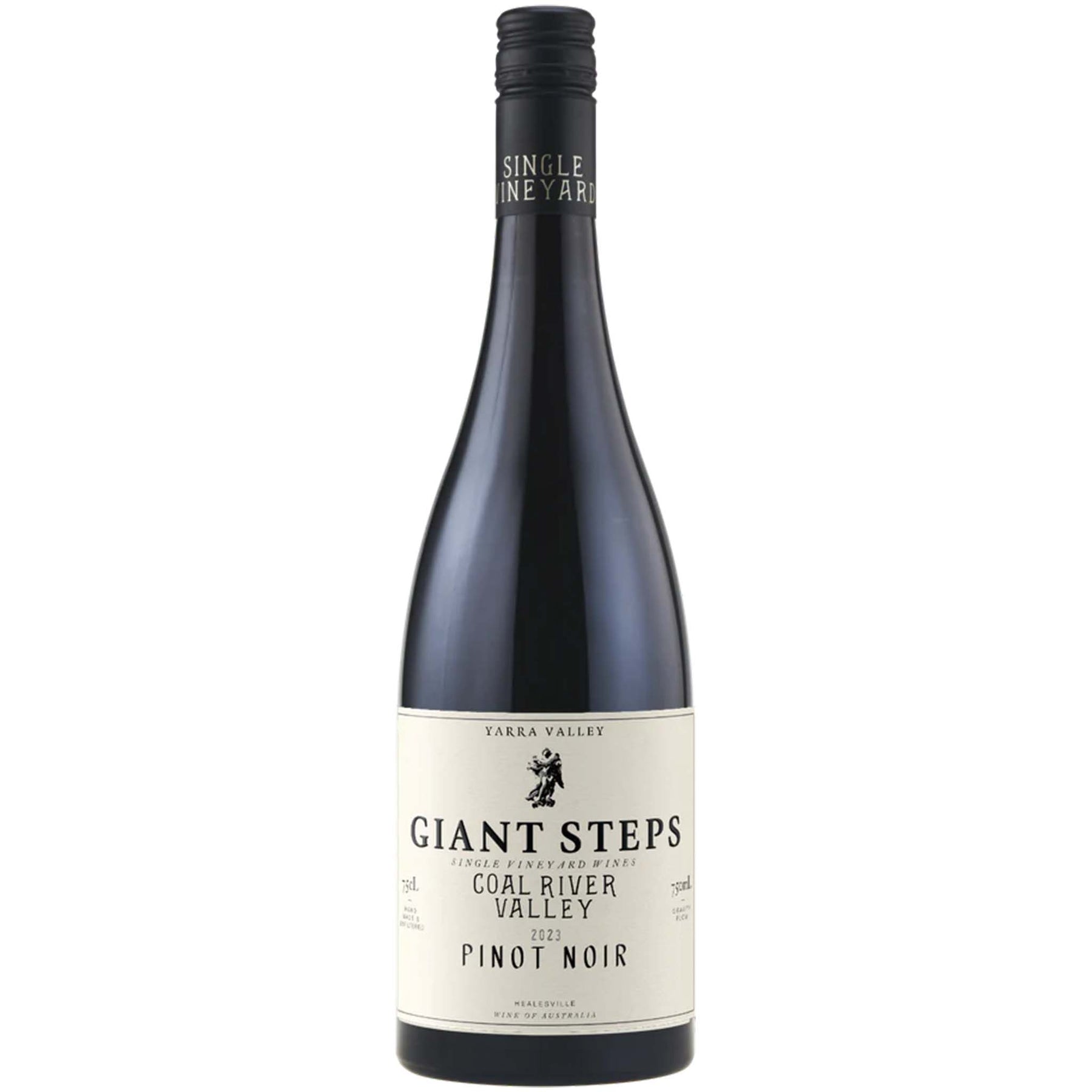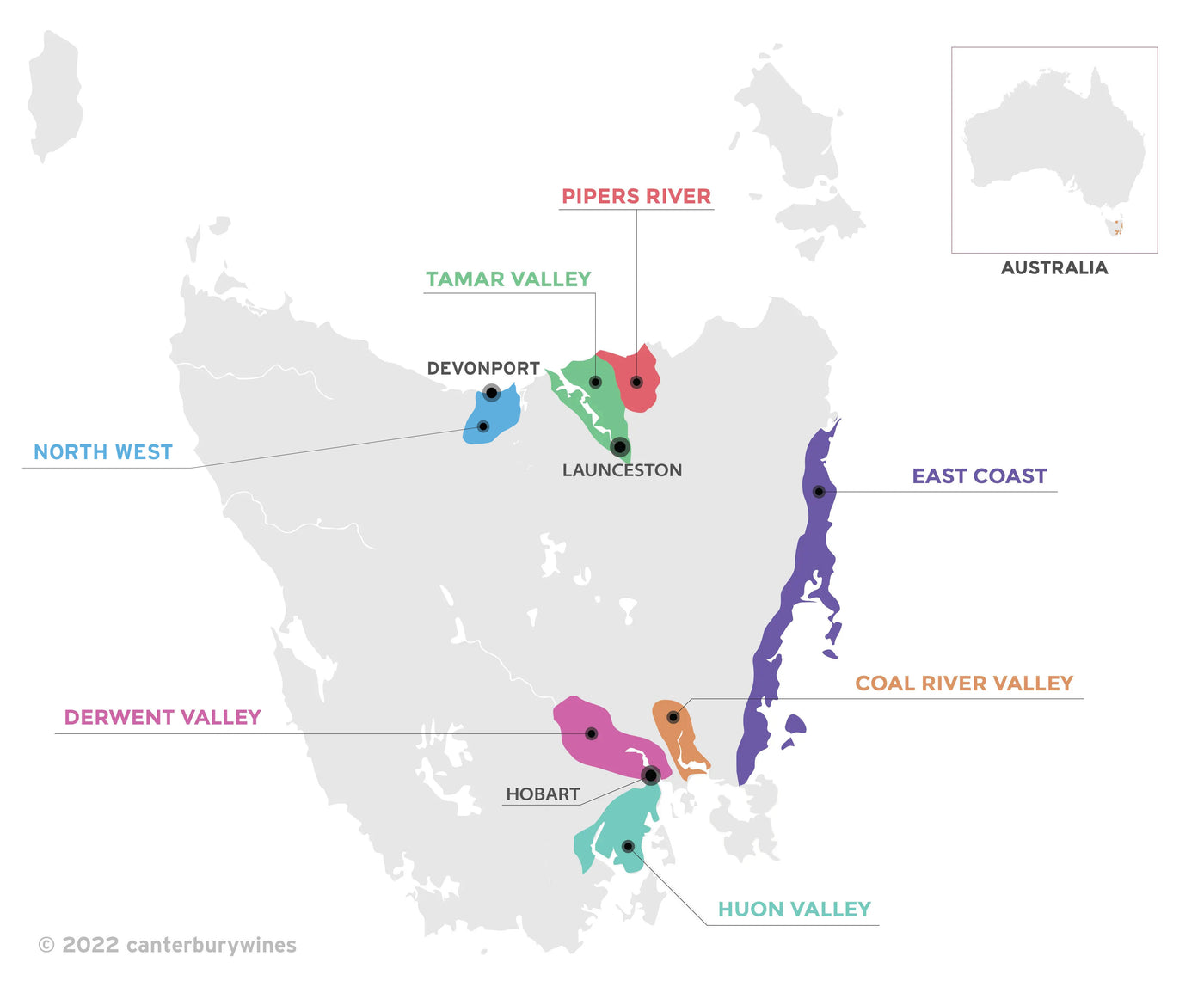

Giant Steps Coal River Valley Pinot Noir 2023
Style: Red Wine
Closure: Screwcap
Giant Steps Coal River Valley Pinot Noir 2023
Warehouse
34 Redland Drive
Vermont VIC 3133
Australia
Critic Score: 96
Alcohol: 13.5%
Size: 750 ml
Drink by: 2033
Giant Steps have ventured to Coal River in Tasmania, almost as far south (and as cold) as you can go in Australia, to make this Pinot Noir. Despite the cool temperatures, the sunlight hours are long and intense, resulting in a powerful Pinot Noir of amazing density and concentration. Previous vintages of this wine were labelled 'Fatal Shore', after a historical novel by Robert Hughes that delves into the dark history of Tasmania's colonisation.
"With its aromas dark fruits, sarsaparilla, violets and bay leaf, this is the big personality in the Giant Step's pinot range! Equally flamboyant on the palate, which is richly fruited and balanced with ripe, muscular tannins ensuring this will be long lived, too." Philip Rich
Fruit for the 2023 Coal River Valley Pinot Noir comes from the Nocton vineyard and is farmed by Giant Step's grower partners in the Valley. The grapes are picked and shipped overnight to the Giant Steps winery in Healesville to be processed the next day. The Nocton Vineyard is located on a northeast-facing slope that is planted to three clones - MV6, D5V12 and G8V3.
"Handpicked, straight into a refrigerated container parked on the vineyard. The fruit is then immediately driven to Devonport and sailed across Bass Strait to arrive at the winery in Healesville the following morning. Fruit was destemmed and cold soaked for three – four days in open oak vats and open stainless-steel fermenters. The MV6 (from the rockiest soils at the top of the hill) was fermented as whole bunches in an oak fermenter. Both parcels were matured in French oak – 25% new, 75% seasoned – for eight months in 225L barriques D&J, Vicard and Taransaud. Bottled by gravity. No fining. No filtration." Giant Steps
Expert reviews
"Medium deep crimson. Lifted black cherry aromas with negroni/ chinotto / marzipan notes. Richly concentrated and pure-fruited pinot noir with intense black cherry, strawberry fruits, some negroni-like flavours, chalky/ al dente textures, underlying vanilla, grilled nut, saline notes and fresh long juicy acidity. Finishes long and crispy. Beautifully made wine with lovely density and volume. Drink now – 2030. Drink now – 2028." Andrew Caillard MW, The Vintage Journal - 96 points
"From a dry vintage with plenty of sunlight on this eastern facing slope. Black cherry, bramble and boysenberry. Wood Ear mushroom, hawthorn and thistle. Pomegranate molasses and olive skin. Prune plums and black fig. Grainy tannins and crunchy acidity, there is good mid palate weight and plenty of length. A hint of black pepper spice with star anise and allspice. Drink now and will cellar 5 years on. A wonderful wine for blueberry cheesecake or a crumbly cheddar and quince paste." Shanteh Wale, Winepilot - 95 Points
"It’s been the dream launch for this year’s release of the Giant Steps single vineyard range, with various awards and accolades won along the way. This Coal River Valley expression is from the Nocton vineyard, planted in 1999. There’s a flashiness to the fruit, the oak and also – if this is possible – the tannin here. Every component just seems to spread and run like atoms in a cartoon. It’s a foresty wine with smoky oak, nail polish, bush spices and purple flower characters on exuberant show. There’s some volume to the fruit in this wine, and a volume to the tannin too, though there’s no hardness or excessive dryness. Wild in a controlled way, you’d call it. It’s also expansive, and that’s what makes the quality feel so high. Drink: 2025 - 2031+." Campbell Mattinson, The Wine Front - 95 points
2024 Australian Pinot Noir Challenge - 95 points
"From the Nocton vineyard in the Coal River Valley. Hand picked into a refrigerated container by 10.30am to make the boat to the mainland; 20% whole bunches, 35% new barriques. A deep crimson purple. With its aromas dark fruits, sarsaparilla, violets and bay leaf, this is the big personality in the Giant Step's pinot range! Equally flamboyant on the palate, which is richly fruited and balanced with ripe, muscular tannins ensuring this will be long lived, too. Drink by 2032." Philip Rich, Halliday Wine Companion - 95 points
Awards
Gold Medal - 2024 Royal Queensland Wine Awards
 In 1997 Phil Sexton arrived in the Yarra Valley in search of ideal sites to produce Chardonnay and Pinot Noir of purity and finesse. He was looking for sites with altitude, aged soils, slopes of exposure, regular rainfall and cool to cold nighttime temperatures and a gentle breeze off the protecting mountain ranges. The Giant Steps winery was established one year later in 1998.
In 1997 Phil Sexton arrived in the Yarra Valley in search of ideal sites to produce Chardonnay and Pinot Noir of purity and finesse. He was looking for sites with altitude, aged soils, slopes of exposure, regular rainfall and cool to cold nighttime temperatures and a gentle breeze off the protecting mountain ranges. The Giant Steps winery was established one year later in 1998.
The focus is on the production of high-quality, single-vineyard wines. The Giant Steps Single Vineyard range is produced from the most site-expressive fruit off the best vineyards in great years. Each single vineyard wine tells a story about the vineyard, vintage and variety. Production of these wines is very limited with some vineyards producing as little as 200 cases.
The single vineyards comprise the Sexton Vineyard in the Lower Yarra and the Applejack Vineyard in the Upper Yarra (both owned by Giant Steps), the Tarraford Vineyard in the Lower Yarra under long-term lease, the Primavera Vineyard in the Upper Yarra under long-term supervised contract and the Wombat Creek Vineyard owned by Hand Picked Wines. In addition, Giant Steps produce a Yarra Valley range of wines made from handpicked fruit from their estate vineyards. They are highly expressive wines, true to the regional characteristics of the Yarra Valley.
The Giant Steps wines have received global acclaim and are now recognized as a global benchmark for cool climate Chardonnay and Pinot Noir. Since 2003 Giant Steps wines have been awarded 34 trophies and over 100 gold medals at major international and domestic wine shows and has been named one of the Top 100 Wineries in the World by US Wine & Spirits Magazine for each of the last six years.
Giant Step's success is due in no small part to Steve Flamsteed, Chief Winemaker since 2003. Steve had previously worked for Leeuwin Estate (1999 – 2002) and the Hardy Wine Company at their Yarra Burn Winery in the Yarra Valley (2002 – 2003). Steve was named Gourmet Traveller Wine 'Winemaker of the Year' in 2016. "Steve Flamsteed is a man of many talents with a finely tuned palate, an instinctive flair for winemaking and fastidious attention to detail. This shows particularly in the stunning single-vineyard chardonnays and pinots of Giant Steps: distinctive wines that reflect their sites and glow with impeccable finesse." Peter Forrestal, chairman of judges, Gourmet Traveller Wine Winemaker of the Year
Melanie Chester joined Giant Steps as Head of Winemaking and Viticulture in 2021. She came to Giant Steps from Sutton Grange Winery in Central Victoria, where she was Head Winemaker. In 2014, Melanie became the youngest ever scholar selected for The Len Evans Tutorial. In 2015, she was named Young Winemaker of the Year by Gourmet Traveller Wine magazine, and in 2018, Melanie was recognized by Young Gun of Wine as the People's Choice award winner for favourite winemaker.
Giant Steps was acquired by the Jackson Family in 2020. The Jackson Family own a vast stable of wineries in California (Napa Valley, Sonoma County, Mendocino County, Monterey County, Santa Barbara and Oregon), Australia (Yarra Valley and McLaren Vale), Chile, France, Italy and South Africa.

Tasmania
Tasmania is a small island located below mainland Australia. It produces less than 1% of Australia’s wine but enjoys a global reputation as a leading producer of premium cool climate wines. It is prized for its top-class sparkling wine, Pinot Noir, Chardonnay and Riesling.
Tasmania is home to more than 230 wineries across 7 wine regions*. The reigions Coal River Valley, East Coast, Pipers River and Tamar Valley produce around 90% of Tasmania's wine, while the other three regions Derwent Valley, Huon Valley and North West produce the remaining 10%. * Please note these 7 wine areas are considered here to be subregions of Tasmania to aid site navigation.
Tasmania is the coldest wine State in Australia. Its climate is temperate, with a distinct maritime influence from the Tasman Sea to the east, Bass Strait to the north and the Indian Ocean to the west. Summer days are temperate while winter sees some of the coldest temperatures in Australia. It's unique climate and soils combine to create ideal growing conditions for cool-climate grape varieties.

 Nocton
Nocton